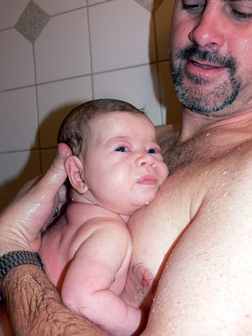|
Pregnancy, childbirth, and becoming a new parent present times of challenge and development, whether it be for the individual or the family. Annemarie van Oploo once shared, “Childbirth is a time when a woman’s power and strength emerge full force, but it is also a vulnerable time, and a time of many changes presenting opportunities for personal growth” (Schwegel, 2005). A new addition to the family requires extra physical, educational, and emotional support. A postpartum doula provides this care by offering a helping hand, a listening ear, and a plethora of resources. Her presence is invaluable and truly makes a difference in the lives of many new families. There are multiple benefits to hiring a postpartum doula for the first few months after baby’s birth, a time also known as “the fourth trimester.” Research indicates that those who hire a postpartum doula make an easier transition at home after baby is born, which ultimately affects family members’ physical and emotional health. These individuals also experience greater parental satisfaction and fewer mood disorders (DONA, 2002). More specifically, families who acquire the help of a postpartum doula experience greater success with breastfeeding, greater self-confidence, and a smaller incidence of postpartum depression (DONA, 2002). The postpartum doula not only “mothers the mother,” but she also tunes into all family members’ needs. In fact, when the postpartum doula “mothers the father,” he is better able to take care of his partner so that she can adequately provide for and nurture their baby. For example, a large factor in breastfeeding success is a supportive partner (Giugliani, 1994). Simple acts such as partner providing snacks, extra pillows, and words of encouragement aid mothers in achieving successful breastfeeding relationships with their babies. It is crucial that women and their families receive postpartum support, especially in North America. Our culture highly values independence, which in turn may lead many individuals to think they must handle their personal issues alone. Unfortunately, this matter carries over into the postpartum period and influences our society’s ideals of the “perfect parent.” The postpartum doula fills this void and prevents isolation from occurring. She becomes a crucial asset in certain situations: The family having no friends or family nearby to help, the mother experiencing a difficult birth, the mother giving birth to a premature baby or multiples, etc. The doula helps to foster a support system that families can utilize in the present and future. According to DONA’s Standards of Practice, the postpartum doula provides support after the baby’s birth as well as up to three months in the family’s home. Certified postpartum doulas affiliated with DONA have completed a 27-hour workshop training, read an extensive list of books pertaining to the postpartum period, and created an informative list of local and national resources. They understand newborn characteristics and basic care, help with breast and/or bottle feeding, assist with light household organization and meal preparation, and provide sibling support if applicable. Their services have been evaluated by at least three families as well as a healthcare professional. Although she does not provide medical assistance, a postpartum doula can make referrals for other professionals if needed. A doula is a generalist, but she has the power to connect families with other experts in the community, helping families to feel cared for and educated. According to DONA’s Code of Ethics, every woman who desires to have a doula should be able to have one. Doulas should set reasonable fees when working with clients. If a doula is not available for a mother who requests postpartum assistance, it is that doula’s responsibility to refer the mother to other doulas who are available (either through local resources or DONA). Follow-up with new moms is crucial in order to ensure they get the help that they need and deserve. When a doula decides to work with a client, she must demonstrate dependability. This involves creating and sharing a contract that discusses services provided, back-up support, refunds, fees, etc. Doulas should always maintain confidentiality when working with their clients. This simple action illustrates respect of privacy and will allow a mother to feel more secure in the care of her doula.  Dad and baby, skin-to-skin. Bringing a new baby into the home not only presents physical challenges, but emotional and mental ones as well. Yes, all moms will have to recover from childbirth and experience sleepless nights, but they, along with other members of the family, will have to adjust their roles, too. Women are now mothers, men are fathers, and the only child is now a big brother or sister. Luckily, this transition will not be as unsteady with a postpartum doula’s guidance. Doulas steer new parents in their new roles as caretakers. When the doula models, demonstrates, and explains certain behaviors and techniques, parents (and siblings) receive concrete instructions and develop coping skills for working with the new baby (Kelleher, 2002). In this way, family members learn how to bond with and integrate baby into their family unit. By providing a nonjudgmental outlook, reassurance, and evidence-based information, the doula fosters independence and confidence in new parents. She helps them to feel empowered and adequate for this challenging yet rewarding new responsibility. Every family will benefit from a postpartum doula’s practical, yet special touch. A doula truly makes the difference! *All content written and compiled by Lindsey Rupp. Please contact me before using anything found here.* Sources:"DONA International – Code of Ethics for Birth Doulas." DONA International. 2005. Web. 20 Oct. 2011.<http://www.dona.org/aboutus/code_of_ethics_birth.php>.
"DONA International – Standards of Practice for Birth Doulas." DONA International. 2005. Web. 20 Oct. 2011. <http://www.dona.org/aboutus/standards_birth.php>. Giugliani, E., Vogelhut, J., Witter, F., & Perman, J. (1994). Effect of breastfeeding support from different sources on mothers' decisions to breastfeed. Journal of Human Lactation, 10(3), 151-161. Kelleher, Jacqueline. Nurturing the Family: The Guide For Postpartum Doulas. Xlibris, 2002. Print. Kelleher, Jacqueline and Penny Simkin. The Postpartum Doula’s Role in Maternity Care: A DONA International Position Paper. 1998. A publication on the value of birth doula support. Schwegel, Janet. Adventures in Natural Childbirth: Tales from Women on the Joys, Fears, Pleasures, and Pains of Giving Birth Naturally. New York: Marlowe &, 2005. Print.
1 Comment
Hi Lindsay,
Reply
Leave a Reply. |
Archives
July 2019
Categories
All
|
Photos from hugabub, supersum (off), Matteo Bagnoli, abdul / yunir, emilio labrador, christyscherrer, USDAgov, Christine Rogers, Joe Shlabotnik, Rachel Coleman Finch, Raphael Goetter, Raphael Goetter, dailycloudt, kellyhogaboom, benklocek, malin_amanda, Matteo Bagnoli, Mothering Touch, best love poem, until we can do better, goldberg, rkimpeljr, Tim & Selena Middleton, Charlie Davidson, rabble, Tim Pierce, jessicafm, thedailyenglishshow, Genista, Brett Jordan

